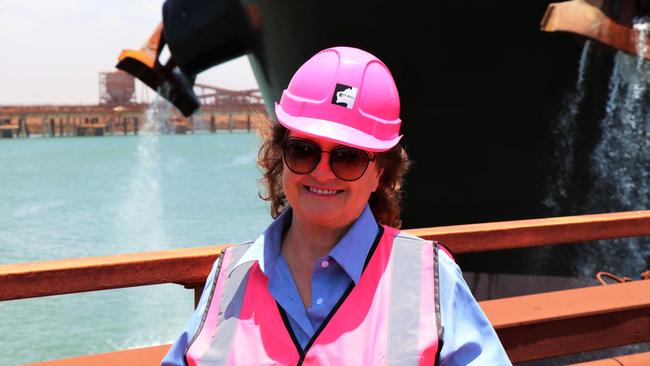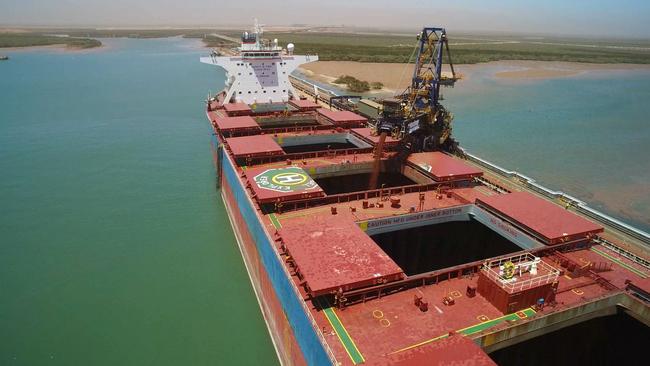No green energy projects without existing mining says Gina Rinehart
The mining magnate says Australia’s reputation as a stable energy supplier is at risk, which will have regional fallout. The huge Roy Hill mine may close in 10 years.

Business
Don't miss out on the headlines from Business. Followed categories will be added to My News.
Billionaire Gina Rinehart has warned the giant Roy Hill mine, which has made huge profits and paid billions in royalties and taxes, is at risk of closing in just 10 years without a change in government policy towards the resources sector.
The mining magnate said there was a $60bn gap in annual mining capital expenditure compared to the previous resources boom a decade ago, describing the lack of approvals for new mines or extending the life of existing projects as a “missed opportunity for Australia”.
In a lunchtime speech on Tuesday at a Queensland Resources Council function in Brisbane, Mrs Rinehart echoed recent concerns from foreign mining and gas investors that Australia’s role as a stable energy supplier in the region was at risk due to recent government policy interventions.”
“We cannot forget the important role Australia’s exports play in regional security and stability,” Mrs Rinehart said
“If Australia does not step up our investment and exports, if we allow Russia to become the preferred supplier of energy and met (metallurgical) coal to Asia, that will have consequences for the security of western countries.”

Mitsui Australia chief executive Masato Sugahara told The Australian this week that some Japanese companies are “nervous about the stability of Australia’s energy supply” and Mrs Rinehart also referenced recent comments by former Japanese ambassador to Australia, Shingo Yamagami, who recently warned of concerns about “sovereign risk” when investing in Australia.
“Governments that massively increase regulation, or who introduce regulatory uncertainty, cannot then expect investors to be forthcoming, even when commodity prices are high. We need to encourage our governments to understand these consequences and change direction,” Mrs Rinehart said.
The Hancock Prospecting chairman noted the lack of new measures for the mining and processing sector in the recent federal budget, which she said forecast that mining investment would not noticeably increase in the next few years.
This, Mrs Rinehart warned, could have consequences for investment in renewable energy and electric vehicles and batteries that need minerals from more traditional mining projects.
“We’re simply not seeing the massive investments you would expect given high commodity prices, and despite the stated need for rapid expansions in metals and minerals supply to be able to meet the government’s green policies,” she said.

Mrs Rinehart told the audience that the unit value of Australia’s commodity exports was currently 30 per cent higher than during the last mining boom of about a decade ago, when annual mining capital expenditure peaked at over $100bn.
“However, today we have just $40bn in mining capital expenditure,” she said.
“This $60bn investment gap is massive, and a missed opportunity for Australia, and can be explained in large part because of the increasing size of government and their increasing regulation. Importantly, the reduced investment has huge consequences for our future.”
One project that could be at risk in the future was Hancock’s Prospecting huge Roy Hill in Western Australia’s Pilbara, which will soon celebrate the 10th anniversary of striking an equity deal with partners Marubeni Corporation, POSCO and China Steel Corporation to build the mine.
Roy Hill started production in 2015, after Mrs Rinehart had led the striking of a near $10bn debt financing package, which has since been paid back in full. The mine has made more than $13bn in net profits in the past two years, and paid more than $5.3bn in company tax and $3bn in royalties to the WA government since production began.
“Roy is estimated to have a mine life left of only approximately 10 years. There is potential if more investment, and if further regulatory hurdles and approvals are achievable, for this to be extended,” Mrs Rinehart said on Tuesday.
“If we want our standards of living to continue, we simply must have more investment in mines, and more mines developed, and for that we need to do far more to ensure that our government much better understands and puts policies in place that actually welcome, not deter, investment.
“Our governments … need to change and be pro-mining … and drop their use of propaganda like ‘dirty mining’ and ‘evil mining’.”
More Coverage
Originally published as No green energy projects without existing mining says Gina Rinehart





